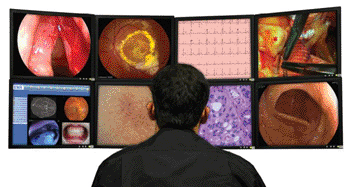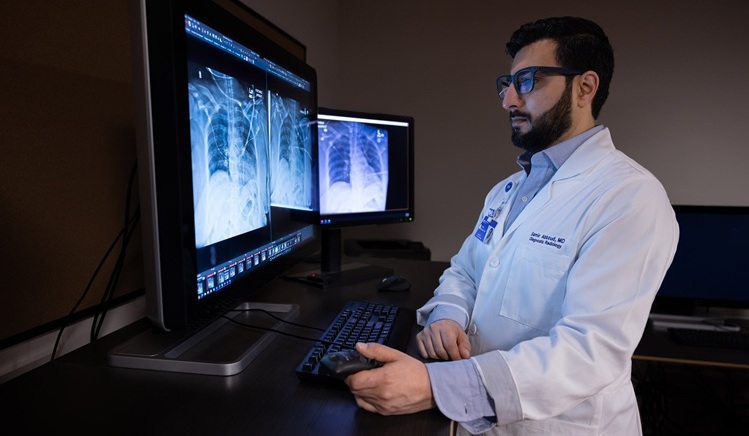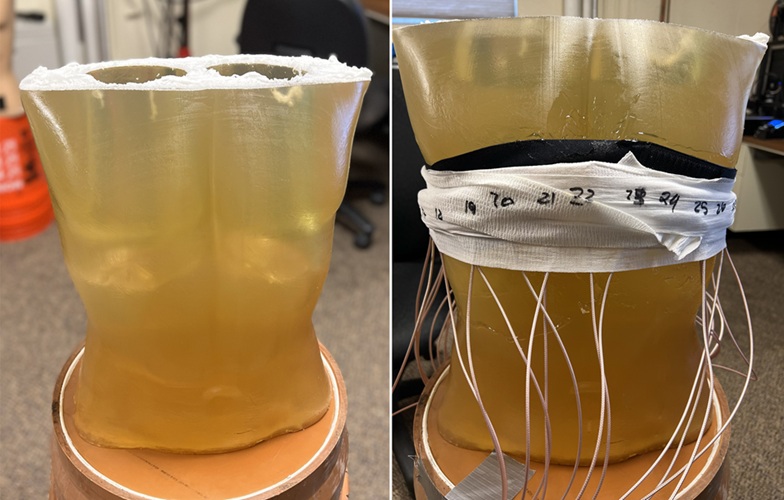Clinical Information System Offers Access to Multispecialty Patient Imaging
|
By MedImaging International staff writers Posted on 25 Feb 2013 |

Image: The imaging clinical information system (ICIS) is designed to unify patient records by incorporating and linking multiple facilities and departments with imaging data (Photo courtesy of Agfa HealthCare).
A new imaging clinical information system (ICIS) unifies patient records by incorporating and linking multifacility and multidepartmental imaging data, providing clinicians with information to support continuity and effectiveness of patient care.
The system provides accessibility to patient care data, including images, to numerous participants, fueling meaningful use (MU) compliance, clinical collaboration, and empowering the patient. Agfa HealthCare (Mortsel, Belgium) provides access, through the electronic medical record (EMR), to create thorough, image-enabled medical records. This provides a longitudinal view of the patient’s imaging throughout the enterprise, so that clinicians have greater insights for the clinical outlook of their patient.
“In the delivery of care today, health systems around the world find themselves struggling to bring together data from various departments around the enterprise. Electronic health records are attempting to solve this problem for data that resides in a patient chart, but that solution leaves images behind,” said James Jay, vice president-imaging informatics, Agfa HealthCare. “As the use of images grows, so does the challenge of enabling access to images to all care providers. In addition, as more departments generate imaging data, simply consolidating storage does not solve the problem. Clinical workflow is needed to acquire, distribute, and review these images. Agfa HealthCare is a leader in recognizing this challenge. ICIS, leveraging our Xero viewer, delivers a comprehensive framework to enable flexible workflows to bring images into every step of the care continuum. This gives clinicians a single point of access for all imaging data, integrated into the electronic health record, which can help reduce duplicate procedures and enable a highly efficient care process.”
Beyond image enabling the EMR, Agfa HealthCare, together with Orion Health (Auckland, New Zealand), a global leader in health information exchange (HIE) and healthcare integration systems, have image-enabled HIEs, additionally furthering collaboration, and supporting ACOs. Images from Agfa HealthCare’s ICIS platform can be merged into a shared “single best view” of the patient using the Orion health clinical portal (currently a work-in progress). Healthcare systems and hospitals, by having a holistic view, can begin treatment of the patient sooner and help decrease costs resulting from unnecessary repeat exams and duplicate test orders.
The Orion health patient portal will also enable patients, their families and care teams to securely access a unified view of their EMR, including the complete longitudinal patient record and medical images due to the Agfa HealthCare technology platform.
“Healthcare reform demands that clinical imaging become a strategic resource advancing continuity of care throughout the enterprise. Working with Orion Health, we help organizations meet meaningful use criteria by providing clinicians with a single point-of-care access to the patient’s comprehensive medical record,” said Michael Green, president and CEO-Americas region, Agfa HealthCare. “Our proven solutions meet today’s healthcare enterprise interoperability challenges. Designed to create workflow and care efficiencies, we bring secure access of information to multispecialty departments, referring physician networks, and the personal care support teams involved in a patient’s care.”
Related Links:
Agfa HealthCare
Orion Health
The system provides accessibility to patient care data, including images, to numerous participants, fueling meaningful use (MU) compliance, clinical collaboration, and empowering the patient. Agfa HealthCare (Mortsel, Belgium) provides access, through the electronic medical record (EMR), to create thorough, image-enabled medical records. This provides a longitudinal view of the patient’s imaging throughout the enterprise, so that clinicians have greater insights for the clinical outlook of their patient.
“In the delivery of care today, health systems around the world find themselves struggling to bring together data from various departments around the enterprise. Electronic health records are attempting to solve this problem for data that resides in a patient chart, but that solution leaves images behind,” said James Jay, vice president-imaging informatics, Agfa HealthCare. “As the use of images grows, so does the challenge of enabling access to images to all care providers. In addition, as more departments generate imaging data, simply consolidating storage does not solve the problem. Clinical workflow is needed to acquire, distribute, and review these images. Agfa HealthCare is a leader in recognizing this challenge. ICIS, leveraging our Xero viewer, delivers a comprehensive framework to enable flexible workflows to bring images into every step of the care continuum. This gives clinicians a single point of access for all imaging data, integrated into the electronic health record, which can help reduce duplicate procedures and enable a highly efficient care process.”
Beyond image enabling the EMR, Agfa HealthCare, together with Orion Health (Auckland, New Zealand), a global leader in health information exchange (HIE) and healthcare integration systems, have image-enabled HIEs, additionally furthering collaboration, and supporting ACOs. Images from Agfa HealthCare’s ICIS platform can be merged into a shared “single best view” of the patient using the Orion health clinical portal (currently a work-in progress). Healthcare systems and hospitals, by having a holistic view, can begin treatment of the patient sooner and help decrease costs resulting from unnecessary repeat exams and duplicate test orders.
The Orion health patient portal will also enable patients, their families and care teams to securely access a unified view of their EMR, including the complete longitudinal patient record and medical images due to the Agfa HealthCare technology platform.
“Healthcare reform demands that clinical imaging become a strategic resource advancing continuity of care throughout the enterprise. Working with Orion Health, we help organizations meet meaningful use criteria by providing clinicians with a single point-of-care access to the patient’s comprehensive medical record,” said Michael Green, president and CEO-Americas region, Agfa HealthCare. “Our proven solutions meet today’s healthcare enterprise interoperability challenges. Designed to create workflow and care efficiencies, we bring secure access of information to multispecialty departments, referring physician networks, and the personal care support teams involved in a patient’s care.”
Related Links:
Agfa HealthCare
Orion Health
Latest Imaging IT News
- New Google Cloud Medical Imaging Suite Makes Imaging Healthcare Data More Accessible
- Global AI in Medical Diagnostics Market to Be Driven by Demand for Image Recognition in Radiology
- AI-Based Mammography Triage Software Helps Dramatically Improve Interpretation Process
- Artificial Intelligence (AI) Program Accurately Predicts Lung Cancer Risk from CT Images
- Image Management Platform Streamlines Treatment Plans
- AI-Based Technology for Ultrasound Image Analysis Receives FDA Approval
- AI Technology for Detecting Breast Cancer Receives CE Mark Approval
- Digital Pathology Software Improves Workflow Efficiency
- Patient-Centric Portal Facilitates Direct Imaging Access
- New Workstation Supports Customer-Driven Imaging Workflow
Channels
Radiography
view channel
AI Radiology Tool Identifies Life-Threatening Conditions in Milliseconds
Radiology is emerging as one of healthcare’s most pressing bottlenecks. By 2033, the U.S. could face a shortage of up to 42,000 radiologists, even as imaging volumes grow by 5% annually.... Read more
Machine Learning Algorithm Identifies Cardiovascular Risk from Routine Bone Density Scans
A new study published in the Journal of Bone and Mineral Research reveals that an automated machine learning program can predict the risk of cardiovascular events and falls or fractures by analyzing bone... Read more
AI Improves Early Detection of Interval Breast Cancers
Interval breast cancers, which occur between routine screenings, are easier to treat when detected earlier. Early detection can reduce the need for aggressive treatments and improve the chances of better outcomes.... Read more
World's Largest Class Single Crystal Diamond Radiation Detector Opens New Possibilities for Diagnostic Imaging
Diamonds possess ideal physical properties for radiation detection, such as exceptional thermal and chemical stability along with a quick response time. Made of carbon with an atomic number of six, diamonds... Read moreMRI
view channel
New MRI Technique Reveals Hidden Heart Issues
Traditional exercise stress tests conducted within an MRI machine require patients to lie flat, a position that artificially improves heart function by increasing stroke volume due to gravity-driven blood... Read more
Shorter MRI Exam Effectively Detects Cancer in Dense Breasts
Women with extremely dense breasts face a higher risk of missed breast cancer diagnoses, as dense glandular and fibrous tissue can obscure tumors on mammograms. While breast MRI is recommended for supplemental... Read moreUltrasound
view channel
New Medical Ultrasound Imaging Technique Enables ICU Bedside Monitoring
Ultrasound computed tomography (USCT) presents a safer alternative to imaging techniques like X-ray computed tomography (commonly known as CT or “CAT” scans) because it does not produce ionizing radiation.... Read more
New Incision-Free Technique Halts Growth of Debilitating Brain Lesions
Cerebral cavernous malformations (CCMs), also known as cavernomas, are abnormal clusters of blood vessels that can grow in the brain, spinal cord, or other parts of the body. While most cases remain asymptomatic,... Read moreNuclear Medicine
view channel
New Imaging Approach Could Reduce Need for Biopsies to Monitor Prostate Cancer
Prostate cancer is the second leading cause of cancer-related death among men in the United States. However, the majority of older men diagnosed with prostate cancer have slow-growing, low-risk forms of... Read more
Novel Radiolabeled Antibody Improves Diagnosis and Treatment of Solid Tumors
Interleukin-13 receptor α-2 (IL13Rα2) is a cell surface receptor commonly found in solid tumors such as glioblastoma, melanoma, and breast cancer. It is minimally expressed in normal tissues, making it... Read moreGeneral/Advanced Imaging
view channel
CT Colonography Beats Stool DNA Testing for Colon Cancer Screening
As colorectal cancer remains the second leading cause of cancer-related deaths worldwide, early detection through screening is vital to reduce advanced-stage treatments and associated costs.... Read more
First-Of-Its-Kind Wearable Device Offers Revolutionary Alternative to CT Scans
Currently, patients with conditions such as heart failure, pneumonia, or respiratory distress often require multiple imaging procedures that are intermittent, disruptive, and involve high levels of radiation.... Read more
AI-Based CT Scan Analysis Predicts Early-Stage Kidney Damage Due to Cancer Treatments
Radioligand therapy, a form of targeted nuclear medicine, has recently gained attention for its potential in treating specific types of tumors. However, one of the potential side effects of this therapy... Read moreIndustry News
view channel
GE HealthCare and NVIDIA Collaboration to Reimagine Diagnostic Imaging
GE HealthCare (Chicago, IL, USA) has entered into a collaboration with NVIDIA (Santa Clara, CA, USA), expanding the existing relationship between the two companies to focus on pioneering innovation in... Read more
Patient-Specific 3D-Printed Phantoms Transform CT Imaging
New research has highlighted how anatomically precise, patient-specific 3D-printed phantoms are proving to be scalable, cost-effective, and efficient tools in the development of new CT scan algorithms... Read more
Siemens and Sectra Collaborate on Enhancing Radiology Workflows
Siemens Healthineers (Forchheim, Germany) and Sectra (Linköping, Sweden) have entered into a collaboration aimed at enhancing radiologists' diagnostic capabilities and, in turn, improving patient care... Read more














.jpeg)



